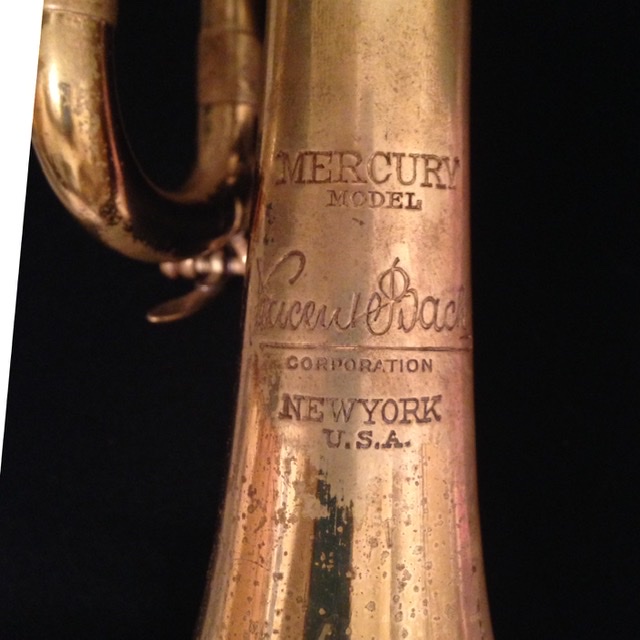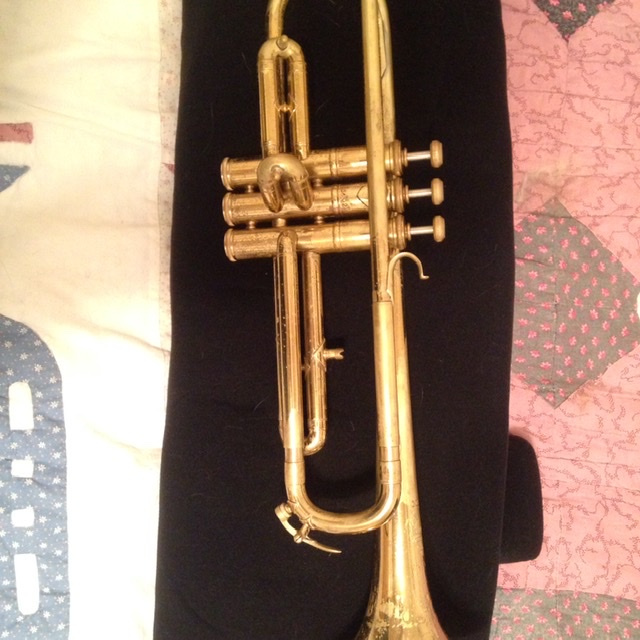1942 Conn 112B
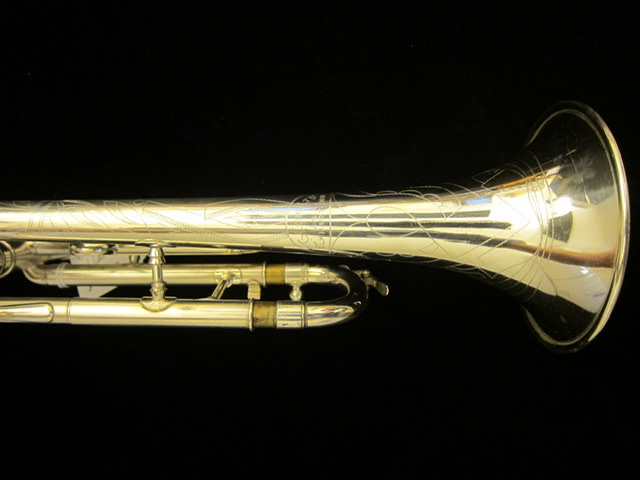
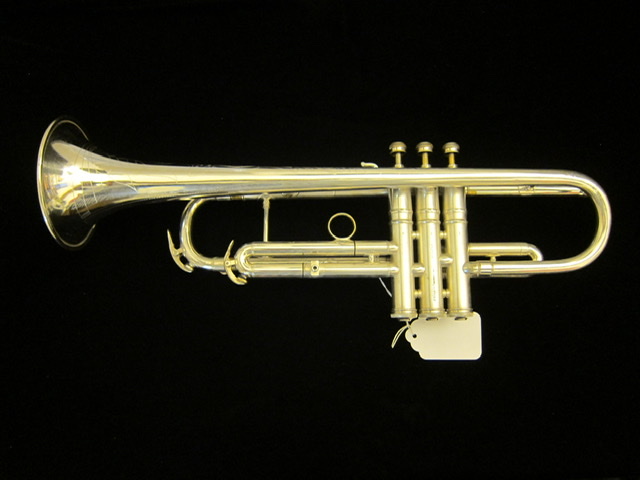
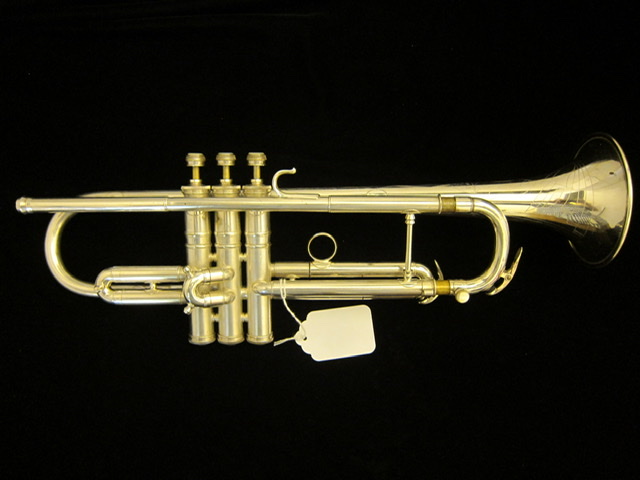
Best posts made by flugelgirl
-
RE: Most bang for your buck!posted in Instruments Discussion
Lucky you who’ve never experienced an accident on a gig- i’ve Had horns knocked around by drunk audience, other musicians, wind blowing music stands, and banging into things in the dark. I always had a secondary horn I used for parades and such in the Navy, but the inventory was so terrible in my first Navy band that I used a less expensive one of my own. I’ve done plenty of civilian gigs over the years that I don’t want to take my best horn on, but also want a dependable player that won’t hold me back, so I’ve always kept my eye on the lower cost alternatives out there. A worn horn holds no sentimental “badge of honor” - I need a working tool to get the job done.
-
RE: Student trumpetsposted in Bb & C Trumpets
I’ve been very impressed by the Jupiter intermediates we have at work. They are more like a stripped down version of the XO than a dressed up student model, like a lot of others. Prices are great and I could gig on one no problem! I still prefer my Adams, of course, but our rep says there are a bunch of Jupiter artists playing them alongside the XO, and I’m not surprised. They also compare very favorably in price to a lot of the student models, so they have sold very well.
-
RE: Woodworking?posted in Lounge
The only woodworking I do is guitar related. My neighbor is a retired carpenter and is always looking for something to do, and has built me a few things out of boredom! Here’s the awesome vise bench he built me and bolted to the wall in about 3hrs!

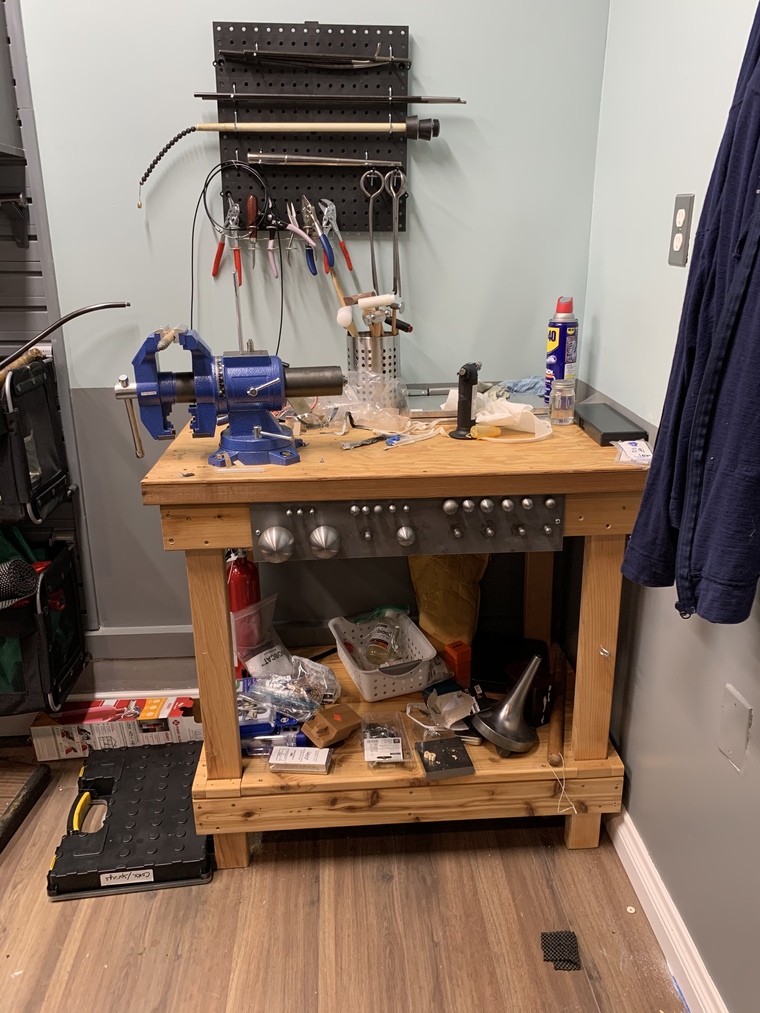
-
RE: Does a large bore horn take more air?posted in Instruments Discussion
@Kehaulani You will definitely find one of them easier to play at the end of the night, but it’s hard to say which one. I’ve played some large bore horns where my phrases are shorter and I gasp rather than breathe at the end of them. I’ve played others that feel like the slots are much further apart, and still others that feel no different from a medium large at all. I usually feel that range is more difficult above a certain point on a medium bore. I’ve found that horns that afford me with better intonation are best for my endurance more than any other factor. Your results may differ, but you really have to try for yourself in the end.
-
RE: Mariachi trumpetposted in Bb & C Trumpets
They were built with input from mariachi players. I think the Bach was built for a specific player whose name escapes me - the Yamaha just specifies input from players of that genre. They don’t play anything alike - the Yamaha is closer to a lead horn, the Bach is quite versatile.
-
RE: Star Spangled Bannerposted in Lounge
With military bands still being mostly quarantined and only doing occasional rehearsals or video, it’s hard to get too picky about amount of rehearsal time spent. I thought they all did a great job for the inauguration. Mad props to the trumpeter who set up Garth Brooks, and to the Army Herald Trumpets - ridiculously hard to sound that good and play so in tune after sitting in the cold forever! I don’t miss that one bit!
-
RE: Vintage Horn Eye Candyposted in Vintage Items
Reynolds with sterling bell - haven’t researched this one yet, but it plays!
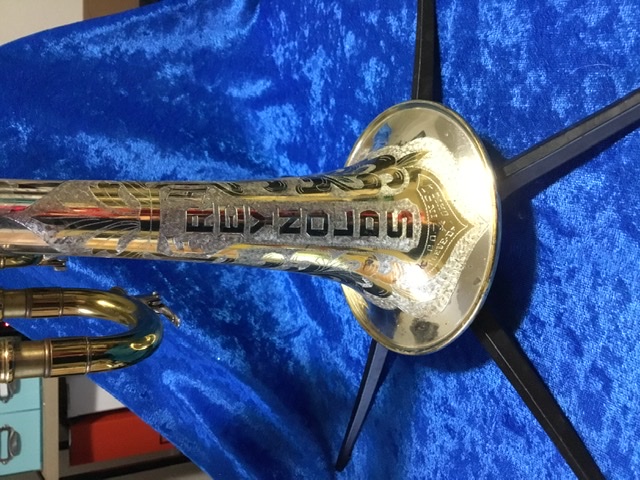
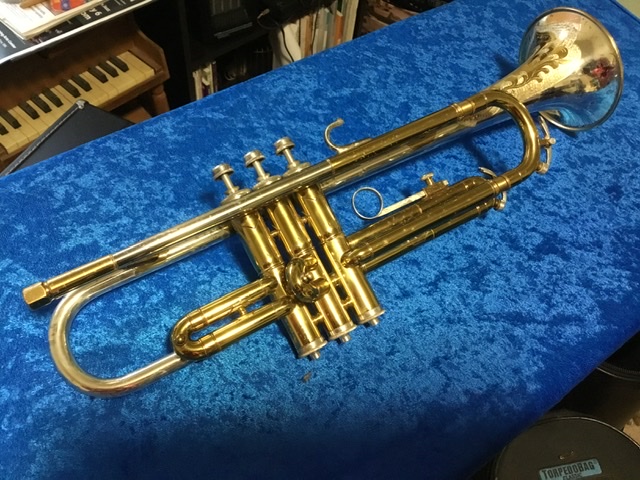
-
RE: Used prices?posted in Instruments Discussion
When buying a used horn you’re not necessarily buying someone else’s problem. Sometimes that horn wasn’t a good fit for the player, or maybe came from someone who quit playing, or even from someone who passed away and the family has no use for the horn. I see horns from these types of situations all the time, and the value you get really depends on the condition of the instrument more than anything else. I know I personally have sold lots of horns that were in wonderful condition just because they didn’t suit my needs anymore and I had bought something different that did. Many of the vintage horns I have owned and worked on have been in good enough condition to gig on, but personally I don’t gig on them because when a vintage horn gets damaged, it can be too difficult to find another one in good condition that plays the same. Get used to carefully checking photos if buying online, and make sure you have a good return policy if you don’t like it. Play in person if at all possible, but don’t be afraid to buy used. Demo horns are also a great option, sometimes labeled open box. They have been played some, but haven’t been owned by anyone. Several of my daily players I purchased as show demo from NAMM, and got a much better deal than new. Most of the show demo we get at work don’t require more than oiling or a clean and polish, and though they may have a few scuffs from being handled are in otherwise brand new condition.
Prices have definitely increased over the years, with new Bach and Yamaha selling in the $4k range, so if you expect to find a brand new pro horn for under $1k, good luck to you. If you can find a horn you can gig with for $250, good for you - enjoy it! That’s not an everyday thing in today’s market. -
RE: Survey: How do YOU test a new trumpet?posted in Bb & C Trumpets
When I play test an instrument I’ve worked on, or a new horn that’s come in, I’m generally testing its mechanics and making sure everything works as it should. I start by looking it over for imperfections, then making sure all caps are free and slides are working as they should. I play a few notes to orient myself on that horn, and then go through a few arpeggios and fast chromatics to make sure valves are fast and smooth, and tuning slides can be used properly. I’ll end with fast chromatic triplets from low f# to C above the staff and back down. If I feel anything weird or stuffy, or if the pistons can’t keep up with me, it goes to my bench. If the horn is for my own use, I’ll play some music I’ll use it for along with the mouthpieces I regularly use in different situations. I keep a test kit of mouthpieces at my bench that will work for pretty much any horn I test at work. Whenever I play test high horns, I play a few pieces I would regularly use on those horns to test intonation.
Sometimes I add some music at the end of my work play testing just for fun or to keep my mind occupied, but normally if you hear me playing some real music on a horn at work it’s because I’m enjoying that particular horn. If you ever order a horn from us and it has a smiley face on the box, it means I especially liked that one!
-
RE: Its Been an Age Long Requirement But How Many Can Do It?posted in Pedagogy
One of my college instructors once told me that getting really proficient at sight reading means seeing it in a series of familiar patterns. He was right! It becomes better with repetition, and part of that is knowing your key center in all 12 keys so you just don’t have to think about it. The longer you spend having to think before reacting, the more behind you are, and time doesn’t wait for any of us.
-
RE: Vintage Horn Eye Candyposted in Vintage Items
Terrible photo, but my early 50s Callicchio! I think this is enough to make you all jealous for now

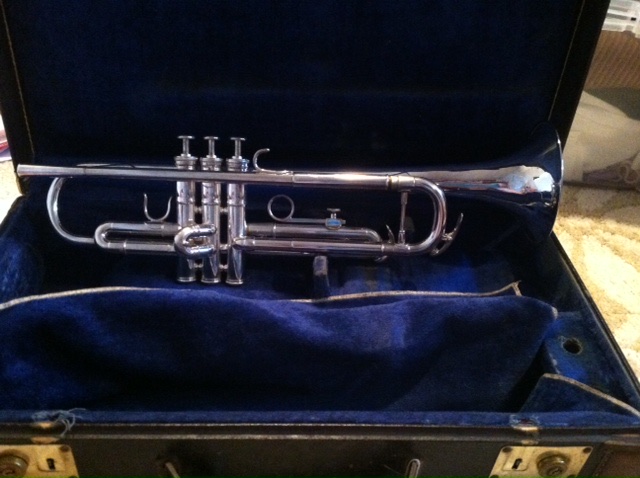
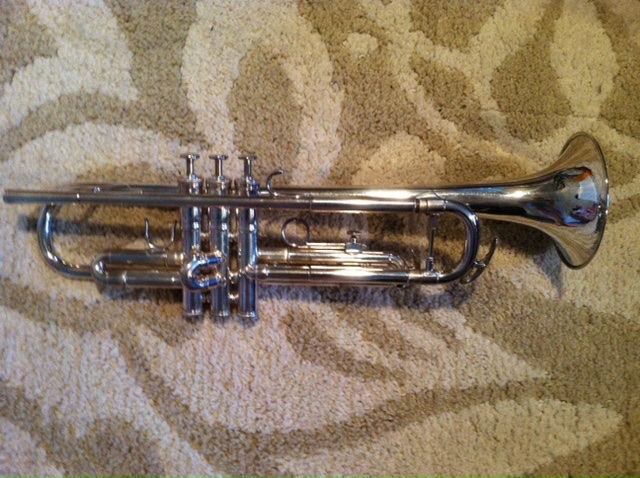
-
RE: Caring for Silver Plate Hornsposted in Instruments Discussion
Really, your silver polish cloth is not going to be able to remove enough silver for you to be able to notice, let alone do damage. When I was in school, I bought a trumpet at a pawn shop that had been rubbed down with Scotch Brite - someone’s attempt at a matte finish. I thought it would always be ugly, but learned that if there is enough silver left it’s possible to buff it back to shiny using the right methods. Except for a couple of spots that had already been scrubbed down to raw brass, you’d never know anything happened to it! My friend’s kid is playing it now

I have found that anti- tarnish strips left in a case make a big difference, as do wiping handprints off after playing. Also, refrain from touching every flat surface of the horn, and you’ll have less to wipe off. -
RE: The Oneposted in Bb & C Trumpets
My A1 is the horn that can do anything. It’s also the horn that I don’t think about having a trumpet in my hands, I just do what I do. No fighting for intonation or squirrelly spots, no limitations except my own. I haven’t had a setting yet where it doesn’t work, from big bands to brass quintets. I like having the A4LT for jazz work where I don’t need to play any lead, but the A1 can really do it all. That doesn’t mean that will never change for me - I make money playing and need equipment that fits me, so I make a change when needed. That being said, there is a gen II A1 out now.....I’ll play it at NAMM

Horns I’ll probably never change - my F1 flugel and P5-4. The flugel is perfect every time and so is the picc. That picc is the only horn I’ve never replaced - been playing it for 20yrs and have never had a reason to. -
RE: Staying in top playing shape post band shutdownposted in Pedagogy
Still no live music here, but no one I know is sick, so at least that is good. I’m currently doing a virtual recording with a group I wouldn’t normally play with just to ease some of the boredom. I also have an adorable new trumpet student - daughter of a college friend. She’s doing very well considering she’s never sat next to another trumpet player! I do think it’s harder to improve as a beginner without hearing those frequencies right next to you! Looking forward to teaching this one in person once we get back to normal.
-
RE: Pic mouthpiecesposted in High Trumpets (Eb
Your mouthpiece choice will depend partly on the picc. Some take a trumpet shank, some take a cornet shank, and some come with leadpipes for both. Stork makes a great picc mouthpiece- their back bores are optomized for picc and it makes a difference in intonation. When I was playing Stork mouthpieces for all my horns, the switch to their picc trumpet shank backbore from their regular backbore made a big difference for me. I recommend staying in a rim that’s close to what you’re used to with maybe a slightly shallower cup. Changing to a drastic rim size difference will be uncomfortable for most, especially casual players. As far as the instrument itself goes, you really get what you pay for in terms of quality. The lowest priced picc I would personally recommend is the Jupiter XO - it’s actually a super fantastic horn and what I would play if I didn’t have or couldn’t afford a Schilke. I tested a few of the newer pics recently back to back, and the Jupiter XO and Fides both performed leagues above the Getzens, which used to be the standby for an affordable picc. I still prefer my P5-4 to any of them, but it sure is nice to have some options at different price points to recommend!
-
RE: Chemical Cleaningposted in Instruments Discussion
Part of training as a tech is learning to use the appropriate chemicals and methods of cleaning, and if your tech is even average, they will know how to do this safely. It’s NOT a hazard to your horn - whether vintage or new. Generally, we use the chemicals to soften up that calcification so we can flush it out with a method better not used in home use. A home soak others have described won’t really hurt your horn, but they won’t do the same job, either. To give you an idea of the safety of pro level chemicals, I can pull horns out of the tank with no gloves and the worst I might get is dry skin or a cut might sting. Older methods/chemicals can be more caustic than the chemical I use, but since 100+ year old horns have more damage from the acid in your skin than the acid in the tank, I wouldn’t worry.
-
RE: The Oneposted in Bb & C Trumpets
@Kehaulani Awesome!! I’ve been playing Trent’s MV3C* as my all-around mpc for about 7yrs now - good fit for me. I’ve switched my lead mpc a couple of times but have settled on the MV3L.
-
RE: Eb Trumpet Questionposted in High Trumpets (Eb
Well, an Eb trumpet is not an Eb cornet. They sound and blend differently, and both are difficult to play. They take a lot of practice for sound and intonation, which also means getting used to the group you’re playing with and their intonation challenges. As far as horns go, some BBB players I know are playing quite well on Yamaha Eb cornets. We had one in at work recently that I play tested, and it was quite nice. That may be a way to go if you’re going to continue on Eb cornet. If not, work with what you’ve got.
